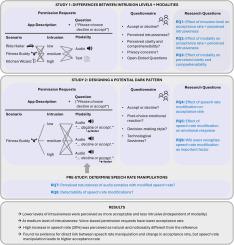Exploring the Impact of Modality and Speech Rate Manipulation in Voice Permission Requests—Limits of Applicability and Potential for Influencing Decision-Making
IF 5.1
2区 计算机科学
Q1 COMPUTER SCIENCE, CYBERNETICS
International Journal of Human-Computer Studies
Pub Date : 2025-09-10
DOI:10.1016/j.ijhcs.2025.103590
引用次数: 0
Abstract
As voice-enabled technologies are becoming increasingly more prevalent, voice-enabled permission requests become a crucial topic of investigation. It is yet unclear how to appropriately inform users in voice user interfaces (VUIs) about data processing practices. To understand how modality (text vs. voice) and the speech rate of the voice can influence users’ perceptions and decisions to grant permission, we conducted two preregistered studies (N = 343 and N = 594) and one pre-study, including two listening tasks to design potentially deceptive voice patterns. We found that users can distinguish between different levels of intrusiveness in the voice modality. However, they are less likely to accept voice-based permissions, pointing to cognitive problems associated with them. Moreover, we found that speech rate manipulations of action verbs “Accept” and “Decline” shifted users’ decisions towards acceptance, making the effect less controllable than predicted. This work highlights implications and design considerations for future voice-enabled permission requests.

探讨语音许可请求中语态和语速操纵的影响——适用性的限制和影响决策的潜力
随着支持语音的技术变得越来越普遍,支持语音的权限请求成为一个重要的研究主题。目前尚不清楚如何在语音用户界面(VUIs)中适当地告知用户有关数据处理实践的信息。为了了解语态(文本vs语音)和语音的语速如何影响用户的感知和授予许可的决定,我们进行了两项预注册研究(N = 343和N = 594)和一项预研究,包括两项听力任务,以设计潜在的欺骗性语音模式。我们发现用户可以区分不同程度的语音语气的侵入性。然而,他们不太可能接受基于语音的许可,这表明与之相关的认知问题。此外,我们发现动作动词“接受”和“拒绝”的语速操纵使用户的决定转向接受,使得效果不如预期的可控。这项工作强调了未来语音允许请求的含义和设计考虑。
本文章由计算机程序翻译,如有差异,请以英文原文为准。
求助全文
约1分钟内获得全文
求助全文
来源期刊

International Journal of Human-Computer Studies
工程技术-计算机:控制论
CiteScore
11.50
自引率
5.60%
发文量
108
审稿时长
3 months
期刊介绍:
The International Journal of Human-Computer Studies publishes original research over the whole spectrum of work relevant to the theory and practice of innovative interactive systems. The journal is inherently interdisciplinary, covering research in computing, artificial intelligence, psychology, linguistics, communication, design, engineering, and social organization, which is relevant to the design, analysis, evaluation and application of innovative interactive systems. Papers at the boundaries of these disciplines are especially welcome, as it is our view that interdisciplinary approaches are needed for producing theoretical insights in this complex area and for effective deployment of innovative technologies in concrete user communities.
Research areas relevant to the journal include, but are not limited to:
• Innovative interaction techniques
• Multimodal interaction
• Speech interaction
• Graphic interaction
• Natural language interaction
• Interaction in mobile and embedded systems
• Interface design and evaluation methodologies
• Design and evaluation of innovative interactive systems
• User interface prototyping and management systems
• Ubiquitous computing
• Wearable computers
• Pervasive computing
• Affective computing
• Empirical studies of user behaviour
• Empirical studies of programming and software engineering
• Computer supported cooperative work
• Computer mediated communication
• Virtual reality
• Mixed and augmented Reality
• Intelligent user interfaces
• Presence
...
 求助内容:
求助内容: 应助结果提醒方式:
应助结果提醒方式:


